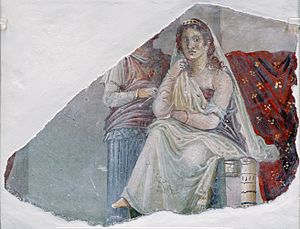Phaedra (mythology) facts for kids

Phaedra is a famous character from Greek mythology. She was the daughter of King Minos and Queen Pasiphaë of Crete. Phaedra was also the wife of the hero Theseus, who was the King of Athens. She was the sister of Ariadne and the mother of two sons, Demophon and Acamas. Her name, "Phaedra," comes from an ancient Greek word that means "bright."
Contents
Phaedra's Family and Home
Phaedra grew up on the island of Crete, a powerful kingdom ruled by her father, King Minos. Her mother, Pasiphaë, was also a significant figure in myths. Later, Phaedra married Theseus, a brave hero known for defeating the Minotaur. As Theseus's wife, Phaedra became the Queen of Athens, a very important city in ancient Greece.
A Tragic Greek Myth
There are several versions of Phaedra's story, but they all tell a sad and dramatic tale. One of the most famous versions was written by the ancient Greek playwright Euripides. In this story, Phaedra falls in love with her stepson, Hippolytus, who is Theseus's son from an earlier relationship. Hippolytus was a devoted follower of the goddess Artemis and was not interested in love or marriage.
When Hippolytus rejected Phaedra, she became very upset. In her despair, she made a false accusation against him to Theseus. This made Theseus very angry, and he cursed his son. The curse led to Hippolytus's tragic death. After these unhappy events, Phaedra also died, often said to have taken her own life out of guilt and sorrow.
Lessons from the Myth
The story of Phaedra is a classic example of a Greek tragedy. It explores themes like forbidden love, pride, and the terrible consequences of false accusations. Ancient Greek myths often taught lessons about human nature and the power of the gods. Phaedra's story shows how strong emotions can lead to very sad outcomes for everyone involved. It reminds us that even heroes and queens in mythology faced difficult challenges and made choices with serious results.
Images for kids
-
Phaedra with an attendant, probably her nurse, a fresco from Pompeii, 60–20 BC
See also
 In Spanish: Fedra para niños
In Spanish: Fedra para niños
 | Audre Lorde |
 | John Berry Meachum |
 | Ferdinand Lee Barnett |


